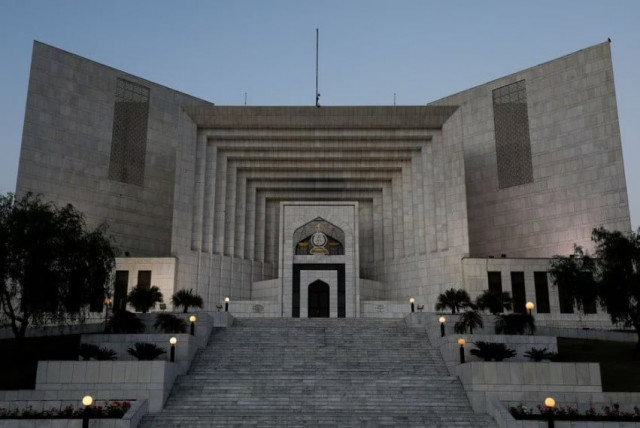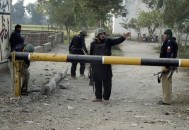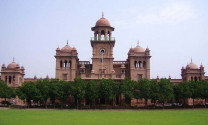Trans community challenges Shariat court's decision in SC
Petition contends FSC ruling has 'thrown community to the wolves' while denying them rights

The transgender community and civil society have challenged the recent decision of the Federal Sharia Court (FSC) that struck down a law aimed at protecting transgender people’s rights and declared that some of its provisions were against Islamic injunctions.
The FSC had declared that certain sections of the Transgender Persons (Protection of Rights) Act 2018 – including those pertaining to gender identity and the right to inherit – contradicted Islamic law, while detractors blasted the law for using transgender rights as a pretext to legalise gay and lesbian rights.
A petition filed in the Supreme Court by Nayab Ali, director of Transgender Rights Consultants Pakistan (TRCT) and Muhammad Sarim Imran contended that the FSC has denied rights to identity to an entire community and “thrown them to the wolves”.
It noted that the parliament via the enactment of the said law sought to own and integrate the marginalised community into the society and give it protection but lamented that the FSC’s decision harmed the members of the community already disowned by their families as well as the society.
“That the verdict has ordered the transgender persons be disowned. That with their backs to the wall, the transgender community will be forced to conclude that the society, the state and its institutions are a warpath against them and that they are victims of genocide by the state.
That unable to stand up the transgender community indeed will face genocide like situation,” the petition read.
It said that the fears about the spread of sexual vices in society are exaggerated and misplaced.
"Homosexuality and lesbian are sexual behaviours. A perfect Male, a perfect Female and a Transgender person (X) also are susceptible to delinquent sexual behaviour and has nothing to do with the Transgender Person (Protection of Rights) Act 2018 or with the Rules made there under.”
It said that homosexuality was strictly forbidden and criminalised under section 377 of PPC which states: Whoever voluntarily has carnal intercourse against the order of nature with any man, woman or animal, shall be punished with imprisonment for life, or with imprisonment of either description for a term which (shall not be less than two years nor more than) 10 years, and shall also be liable to fine.
It further emphasised that the interpretation of Quran and religious injunctions should be based on knowledge and logic “and empathy is shown particularly towards the marginalised, wretched of the earth”.
The interpretations and legislation must not be based on ignorance, fears and suspicions, it added.
The petition stated that the GSP Plus status to Pakistan is currently being reviewed which will be completed by December 2023. The review will determine whether the special preferential treatment is extended or not.
"It seriously imperils the continuation of the GSP plus status for Pakistan. It will gravely undermine its exports entailing serious consequences for the national economy. That disregarding the rights of a minority community also entails risks of losing economic incentives offered by the international community. That transgender persons continue to be hounded, tortured and killed with impunity in Pakistan.”
Citing reports according to which forty-four transgender women have been killed in Pakistan since 2021, the petition feared that if the rights enshrined in the act were denied, the life of a community who does not conform to a legally binding and socially enforced gender binary “will become a hell”.
That state policies must be guided by evidence, moderation, empathy and best international standards and practices and not by fear, suspicion and hatred propagated by extremists", it added.
It further explained that NADRA issued 125,000 CNICs on a daily basis out of which 56 per cent were women. “In no case, NADRA asks an applicant to produce a medical certificate. That non-consensual medical test is against human rights norms and is not allowed. “When no one is asked to produce a medical certificate why should a transgender be subjected to intrusive and humiliating medical examination,” it questioned.
"The Council of Islamic Ideology (CII) was also consulted during deliberations on the impugned Act. The Chairman of CII participated in the discussion in Senate Committee as well as in the Task Force on Transgender on Wafaqi Mohtasib and endorsed the self-perceived identity of a transgender as is borne by the record of the proceedings. Furthermore, the CII can only give an opinion but it is not binding on the legislature to accept its opinion. The CII has in the past rendered opinions that were not accepted by the Parliament.”
It argued that because of ambiguous sexual characteristics and the fact that some intersex adults may be infertile, intersex people have often been seen through the framework of a “medical condition”, “disorder” and “disability”.
This framework links intersex with “abnormality”, leading to stigmatisation that intersex people wish to avoid.
In 2009, the Supreme Court of Pakistan for the first time recognized the unique gender identity of transgender individuals.
The apex court initiated reforms for the protection of the rights of transgender individuals and directed NADRA to devise guidelines for the issuance of CNICs to all transgender individuals and created a legal framework for their full and equal participation in society.
In the second Order on 20 November 2009, the SC ruled that families cannot deprive transgender individuals of their legal inheritance by disowning them because of who they are. It further ruled that transgender individuals have the right to register their names in the electoral list and have the right to cast a vote when they desire.
Similarly, in the third order dated 23 December 2009, the SC ordered the government to devise a special policy for the benefit of transgender people, while in its penultimate order of 22 March 2011, the court expressed satisfaction at the new NADRA policy, under which transgender individuals could register their non-binary gender identity as a separate gender category on their NIC.
The orders, the petition noted, provided legal recognition of transgender identity, led to some positive changes in government policy and opened the door for future transgender applicants to approach the courts.
It recalled that the SC orders also had a profound impact on the public discourse surrounding the rights of transgender people by bringing the issues to the public limelight, paving the way for future legal reforms and opening the door for possible positive change in society’s perception about Khawaja Siras and Hijras.
One immediate impact of the act was that 13 transgender candidates ran for office in the 2018 general elections.It also cited an edict issued collectively in June 2016 by 50 clerics of Tanzim-e-Ittehad-Ummat Pakistan that declared that marriage between transgender persons is lawful and permissible in Islam.
Unfortunately, the Federal Shariat Court’s decision to strike down key provisions of the Act without sufficient Islamic justification would be a huge blow to the basic concepts of human autonomy and dignity, the petition regretted.
The petition prayed the SC to declare that legislation represents the ijma (consensus) of the community enacted by duly elected representatives and is entitled to a presumption of validity which cannot be interfered with by the Federal Shariat Court in the absence of a clear violation of explicit Islamic injunctions as laid down in the Holy Quran and Sunnah.
It also declared that the Federal Shariat Court has no jurisdiction save as expressly conferred by the constitution and can give no binding finding or observation in respect of legislation other than to hold that a particular legal provision is violative of the Injunctions of Islam as laid down in the Holy Quran and Sunnah.
It argued that the judgment was unlawful, unconstitutional and without jurisdiction and should be set aside, and prayed that as an interim measure no official, authority or government, including NADRA, may act on the basis of the Impugned judgment in the presence of this appeal, given the proviso to Article 203(D)(2) of the Constitution which provides that the impugned judgment has no effect before the disposal of this appeal.



















COMMENTS
Comments are moderated and generally will be posted if they are on-topic and not abusive.
For more information, please see our Comments FAQ